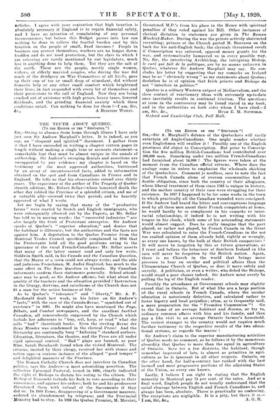THE TRUTH ABOUT QUEBEC. [To THE EDITOR OF THE "
SPECTATOH."3
8112,—Owing to absence from home through illness I have only just seen Sir Andrew Maephail's letter. It is indeed, as you say, an "eloquent and spirited" document. I gather from it that I have succeeded in writing a chapter sixteen pages in
length without making a single true or accurate statement—a remarkable feat that must be almost unique in the annals of authorship. Sir Andrew's sweeping denials and assertions are unsupported by any evidence: my chapter is based on the testimony of the most approved authorities, buttressed by an array of uncontroverted facts, added to information obtained on the spot and from Canadians in France and in England. He tells us that his observations extend over thirty years. The experience of the author of The Tragedy of Quebec (fourth edition), Mr. Robert Sellar—whose lamented death the other day robbed the Province of a splendid citizen, and me of a valuable ally—covered twice that period; and he heartily approved of what I wrote.
Let me begin by saying that many of the "productive farms" were started by Scotch and English immigrants, who were subsequently elbowed out by the Papists, as Mr. Seller has told us in moving words: the "successful industries" are also largely the fruit of Protestant enterprise. Sir Andrew speaks of Quebec's "superior education," and denies that the habitant is illiterate; but the authorities and the facts are against him. A deputation to the Quebec Premier from the Montreal Trades Council specifically complained in 1916 that the Protestants held all the good positions owing to the ignorance of the rural French-Canadians : Mr. Seller asserts that many of the latter cannot read and only few write. Goldwin Smith said, in. his Canada and the Canadian Question, that the Mayor of a town could not always write; and the able and judicious Frenchman, M. Andre Siegfried, has much to the same effect in The Race Question in Canada. My Canadian informants confirm these statements generally. School attend- ance may be good, as Sir Andrew affirms; but what about the quality of the teachers and the education provided ? Instruction in the liturgy, doctrine, and catechisms of the Church does not fit a man for the active business of life.
As to Quebec's "tolerance" and "liberty," Mr. A. P.
Macdonald dealt last week, in his letter on Sir Andrew's "facts," with the case of the Canada-Revue, " squelched.out of existence" in 1693. He might also have mentioned the Pays, Debuts, and Combat newspapers, and the excellent Institut Canadien, all remorselessly suppressed by the Church which forbids her adherents to "buy, sell, keep, or read" what she calls " bad " (heretical) books. Even the sterling Revue des .Deux Afondes was condemned in the clerical Press! And the Hierarchy are continually busy "Indexing" -standard authors. Education, literature, the theatre, and the Press are all under rigid episcopal control. "Bad" plays are banned, as poor Mime. Sarah Bernhardt found when she visited Montreal. The eitizens, incited by their clergy, received her with stones and rotten eggs—a curious instance of the alleged "good temper" and delightful manners of the Province.
The Roman Catholic Church does not interfere in Canadian politics, says Sir Andrew—a most astonishing assertion. The collective Episcopal Pastoral, issued in 1896, clearly indicated the right of Bishops to dictate his voting to the citizen. The Bishop of Rimouski forbade his flock to vote according to their consciences, and against his orders; both be and his predecessor threatened them with refusal of the .Sacraments if they did so.. In 1899 Rome, disapproving of a Government measure, ordered its abandonment by telegram; and the Provincial • Ministry had to obey. In 1888 the Quebec Premier, M. Mercier,
threatened M.P:'s from his place in the House with 'spiritual penalties if they voted against his Bill. •Other instances of clerical dictation to statesmen are given in The Roman Mischief-Maker. During the war the priests actively obstructed recruiting; princes of the Church patted M. Bourassa on the back for his anti-English book; the clericals threatened revolt if Conscription was enforced, opposed money grants for the war, and systematically hampered us in every possible way. No, Sir, the interfering Archbishop, the intriguing Bishop, le cure qui fait de la politique, are by no means unknown in Quebec, whatever Sir Andrew Macphail may say. He con- cludes his letter by suggesting that my remarks on Ireland may be as "obviously wrong" as my statements about Quebec; doubtless he is of opinion that Irish priests and Bishops do not "interfere in politics."
Quebec is a solitary Western outpost of Mediaevalism, and the close contact of reactionary, ideas with extremely up-to-date ones inevitably results in continual friction. The questions at issue in the controversy may be found stated in my book, and in the authorities on both sides whom I have cited.—I


































 Previous page
Previous page